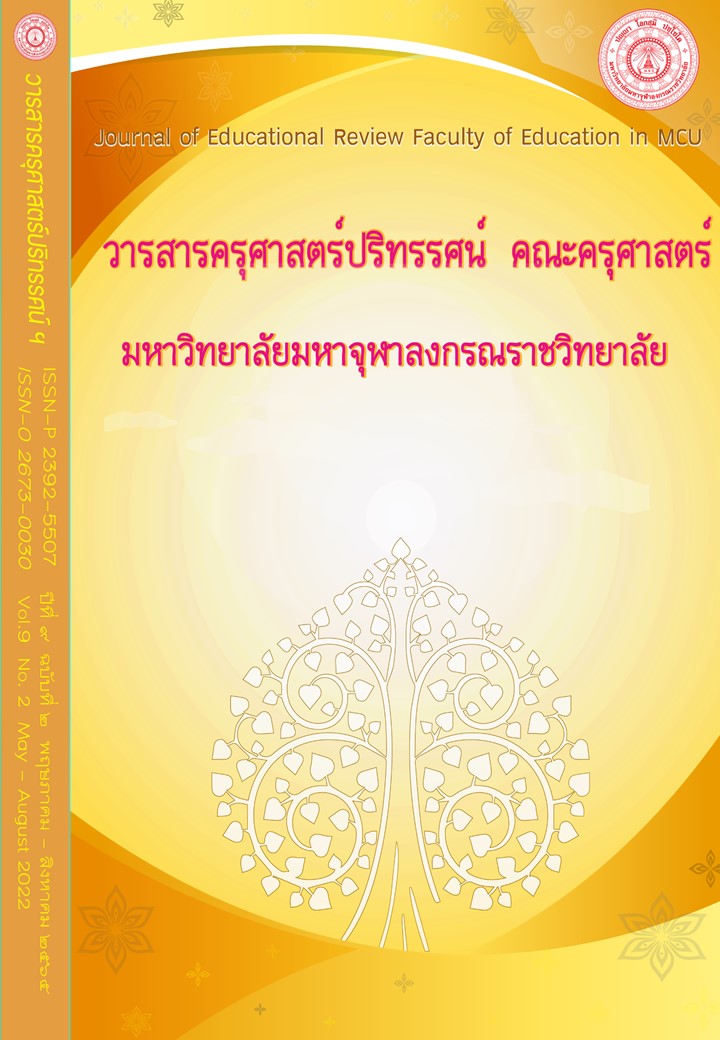A MODEL OF STUDENT’S AGGRESSIVE BEHAVIORS PROMOTING ADJUSTMENT ACCORDING TO BUDDHIST PRINCIPLES FOR EDUCATIONAL INSTITUTIONS UNDER THE OFFICE OF PRIMARY EDUCATION AREA
Main Article Content
Abstract
The objectives of this research article were to 1) study the state and problem of student’s aggressive behaviors promoting adjustment according to Buddhist principles, 2) create a model of student’s aggressive behaviors promoting adjustment according to Buddhist principles, and 3) propose the model of student’s aggressive behaviors promoting adjustment according to Buddhist principles. Mixed methods research was used in the study. The qualitative data were collected from documents, in-depth interviews with 5 school administrators and focus group discussions with 10 experts and then analyzed by content analysis. The quantitative data were collected through questionnaires from 372 teachers and 362 school administrators obtained by multi-stage random sampling. The data were analyzed by percentage, frequency, mean and standard deviation. Results found that 1) the overall of state and problem of student’s aggressive behaviors promoting adjustment according to Buddhist principles was at a moderate level. 2) Model of student’s aggressive behaviors promoting adjustment according to Buddhist principles consisted of 5 components; Part 1 Principle, Part 2 Objective, Part 3 The process of promoting the reduction of aggressive behavior among students consisted of (1) the student care system, (2) factors affecting the aggression behavior, (3) the process of reducing aggression behavior, (4) Buddhist principles (Tri-Sikkha) such as Sila, Samadhi and Panya, and (5) a project for reducing aggressive behavior, Part 4 Practice guidelines, and Part 5 Achievement condition. 3) A model of student’s aggressive behaviors promoting adjustment according to Buddhist principles was of the greatest benefit whereas accuracy, suitability and the possibilities were at high level, respectively.
Article Details

This work is licensed under a Creative Commons Attribution-NonCommercial-NoDerivatives 4.0 International License.
ทัศนะและความคิดเห็นที่ปรากฏในบทความในวารสารฉบับนี้ถือเป็นความรับผิดชอบของผู้เขียนบทความนั้นเพียงผู้เดียว และไม่ถือเป็นทัศนะและความรับผิดชอบของกองบรรณาธิการ
กองบรรณาธิการขอสงวนสิทธิ์ในการคัดเลือกบทความลงตีพิมพ์และจะแจ้งให้เจ้าของบทความทราบหลังจากผู้ประเมินบทความตรวจอ่านบทความแล้ว
ต้นฉบับที่ได้รับการตีพิมพ์ในวารสารครุศาสตร์ปริทรรศน์ คณะครุศาสตร์ มหาวิทยาลัยมหาจุฬาลงกรณราชวิทยาลัย ถือเป็นกรรมสิทธิ์ของคณะครุศาสตร์ มหาวิทยาลัยมหาจุฬาลงกรณราชวิทยาลัย ห้ามนำข้อความทั้งหมดหรือบางส่วนไปพิมพ์ซ้ำ เว้นเสียแต่ว่าจะได้รับอนุญาตจากมหาวิทยาลัยฯ เป็นลายลักษณ์อักษร
References
พระณรงค์เดช อธิมุตฺโต (เดชาดิลก). (2560). รูปแบบการพัฒนาศูนย์การเรียนรู้โรงเรียนวิถีพุทธ. ดุษฎีนิพนธ์พุทธศาสตรดุษฎีบัณฑิต. มหาวิทยาลัยมหาจุฬาลงกรณราชวิทยาลัย.
พระมหาศิวะเสน ญาณเมธ. (2561). หลักไตรสิกขาสำหรับการบริหารจัดการการความขัดแย้งเพื่อลดพฤติกรรมความก้าวร้าว. ดุษฎีนิพนธ์ปรัชญาดุษฎีบัณฑิต. มหาวิทยาลัยสยาม.
พระสรวิชญ์ อภิปญฺโญ และนิเวศน์ วงศ์สุวรรณ. (2553). การสร้างและพัฒนารูปแบบการลดพฤติกรรมความรุนแรงของวัยรุ่นตามแนวทางพระพุทธศาสนา. รายงานการวิจัย. มหาวิทยาลัยมหาจุฬาลงกรณราชวิทยาลัย.
พระอนุสรณ์ กิตฺติวณฺโณ. (2561). รูปแบบการปรับเปลี่ยนพฤติกรรมก้าวร้าวของนักเรียนเชิงพุทธบูรณาการ. วารสารวิชาการธรรมทรรศน์. 18(3). 317-326.
มิสชนัญญา เงินเมือง. (2553). ความสัมพันธ์ระหว่างความฉลาดทางอารมณ์ การทำหน้าที่ของครอบครัว และพฤติกรรมความก้าวร้าวของนักเรียนชายระดับชั้นประถมศึกษาปีที่ 6. รายงานการวิจัย. โรงเรียนอัสสัมชัญ.
วลัยกรณ์ แพร่กิจธรรมชัย. (2555). ผลของการปรับพฤติกรรมเพื่อลดความก้าวร้าวของวัยรุ่นกลุ่มเสี่ยง. วิทยานิพนธ์การศึกษามหาบัณฑิต. มหาวิทยาลัศรีนครินทรวิโรฒ.
สมเด็จพระพุทธโฆษาจารย์ (ประยุทธ์ ปยุตฺโต). (2561). พจนานุกรมพุทธศาสนา. พิมพ์ครั้งที่ 34. นนทบุรี: เอส อาร์ ปริ้นติ้ง แมส โปรดักชั้น.
สุชาติ ประสิทธิ์รัฐสินธุ์. (2544). ระเบียบวิธีการวิจัยทางสังคมศาสตร์. กรุงเทพมหานคร: สำนักพิมพ์เฟื่องฟ้าพริ้นติ้ง.
Cronbach, L. J. (1984). Essentials of psychological testing. 4 th ed. New York: Harper & Row.
Santor, Darcy A. Ingram Adrienne and Vivek Kusumakar, Influence of Executive Functioning Difficulties on Verbal Aggression in Adolescents: Moderating Effects of Winning and Losing and Increasing and Decreasing Levels of Provocation. Aggressive Behavior. 29(6). 475-488.


